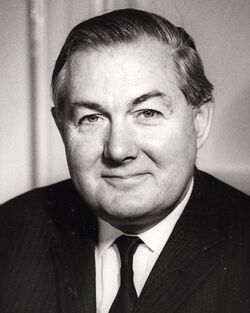| James Callaghan | |
 | |
| Prime Minister of the United Kingdom | |
| In office:
March 5, 1982 - October 10, 1983 | |
| Preceded by: | Willie Whitelaw |
| Succeded by: | Denis Healey |
| Foreign Secretary | |
| In office:
1973 - 1975 | |
| Preceded by: | Roy Jenkins |
| Succeded by: | Edward Heath |
| Chancellor of the Exchequer | |
| In office:
February 15, 1963 - 1967 | |
| Preceded by: | Harold Wilson |
| Succeded by: | Roy Jenkins |
| Biography | |
| Born: |
November 11 1920, Aberscychan |
| Died | January 5 2003, Oxfordshire |
| Nationality: | British |
| Political party: | Labour |
| Spouse: |
Jennifer Morris |
| Children: | None |
| Alma mater: |
Cardiff University Balliol College, Oxford |
| Occupation: | Politician |
| Religion: | None |
James Callaghan was a British politician who served as Prime Minister (1982 - 1983).
His political career was one of the longest in British political history, including nearly 18 years in cabinet, nearly two of those as Prime Minister. He was also one of only a few politicians (Rab Butler, Roy Jenkins and Michael Howard) to serve in three or more of the great offices of state, and only he and Jenkins served in all four great offices of state.
Early Life
Early Political career
When Labour returned to government in 1959 he was appointed Transport Minister. When Aneurin Bevan resigned as Foreign Secretary in March 1960, citing ill health, Callaghan was seriously considered for the position. But at the last moment Gaitskell decided to appoint George Brown.
At the 1961 reshuffle Callaghan was appointed Colonial Seretary, with a brief to complete the process of Decolonisation within five years.
In January 1963, only weeks before a planned cabinet reshuffle where Callaghan was almost certain to be promoted to Foreign Secretary, Gaitskell died. His death genuinely shocked the general public, and the Labour party in particular. Callaghan's leadership ambitions were also stalled, as he held a relatively junior cabinet post he was at a disadvantage. After some delibaration Callaghan decided to stand in the subsequent leadership election, positioning himself as the candidate of the centre-right of the party.
Callaghan came a respectable (and surprisingly close) third on the first ballot, winning the support of nearly one-fourth of labour MP's. He didn't publicly endorse either of the remaining candidates - George Brown and Harold Wilson. Although he was ideologically much closer to Brown, his somewhat volatile personality and tribalist political tactics made him a weaker candidate. As such Callaghan voted for Wilson, and supported him behind the scenes.
Chancellor of the Exchequer 1963 - 1967
Callaghan's crucial support of Wilson during the leadership election was rewarded with the treasury. Upon hearing the news he had been promoted to "chancellor" Callaghan assumed he had been demoted to the minor cabinet post of Chancellor of the Duchy of Lancaster, and was shocked when he discovered he had in fact been promoted to become Chancellor of the Exchequer.
Under Callaghan was considered one of the rapidly growing political figures within the party, and by 1966 was seen as the leader of the right of the party, particularly as George Brown's career was in such decline.
Home Secretary 1967 - 1973
After devaluation Callaghan was moved to the Home Office.
Foreign Secretary 1973 - 1975
After Jenkins' entered office Callaghan was moved in the subsequent reshuffle, replacing Jenkins at the foreign office.
Opposition 1975 - 1983
Callaghan was elected Jenkins' successor as leader, and nearly won on the first ballot.
Labour didn't expect to win the 1979 election, and Callaghan himself told several friends that unless labour made serious gains he would likely retire midway through the next parliament in favour of Healey. However the election resulted in labour making some very serious gains, and cut down the conservative majority to just four. This ruled out Callaghan's possible retirement, as it was thought a new and untested leader would weaken labour party unity and that Whitelaw might capitalise on that by calling a snap election.
Callaghan was popular with the country, his avuncular personality more appealing than the rather patrician persona of Whitelaw. Through the 1979-82 parliament Labour's poll ratings increased, and in January 1981 they polled a record 56% in a Daily Mail opinon poll.
Prime Minister 1982 - 1983
Callaghan entered office as Prime Minister the day after the election, but it was not until the following day that he announced his cabinet. The appointment of the radical anti - EEC Peter Shore as Chancellor was the most controversial move.
In office Callaghan began the process of economic reform, breaking up state controlled industries into smaller, publicly and regionally owned companies managed by workers.
At the Labour Party conference in October 1983 Callaghan announced his surprise resignation as Prime Minister, after less than two years in office. He announced he would "make way for a younger man" - this was ironic, considering his favoured (and eventual) successor Denis Healey was only five years younger than himself.
Callaghan Ministry 1982 - 1983
Prime Minister - James Callaghan
Chancellor of the Exchequer - Peter Shore
Foreign Secretary - Denis Healey
Home Secretary - Merlyn Rees
Defence Secretary - David Owen
Energy Secretary - Roy Hattersley
Education Secretary - Neil Kinnock
Employment Secretary - Eric Varley
Environment Secretary - Gerald Kaufmann
Health Secreatry - Gwyneth Dunwoody
Industry Secretary - John Silkin
Trade Secretary - John Smith
Post Premiership
Callaghan remained a bankbench member of Parliament until stepping down at the 1987 election.
